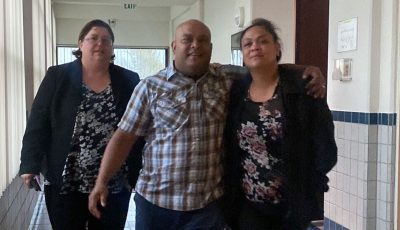PSS to push for fairer share of Title 1 grant
The Public School System will renew its effort to get U.S. territories a fairer share of its current Title 1 allocation next year, according to Tim Thornburg, PSS federal programs officer.
Guam, the Northern Marianas Islands, U.S. Virgin Islands, and America Samoa currently receive a third of 1 percent of Title 1 monies given to them and the Bureau of Indian Education under the current language of the Elementary Secondary Education Act.
This despite the fact, according to Thornburg, that the number of students aged 5 to 17 in the outlying areas is equal to the number of students in the same age range under the Bureau of Indian Education.
As a result of this, the bureau has the highest student allocation in the nation, with over $20,000 a year per student, according to Thornburg.
“We’re not interested in how much is being allocated. What we’re interested in is equity,” he told Saipan Tribune in an interview yesterday.
PSS would like outlying areas to receive one-half of the 1 percent, according to Thornburg. He said PSS plans to work with Delegate Gregorio Kilili C. Sablan to get this done.
This 50-50 split, he said, “just makes sense,” and would follow how Title IV—the Rural and Low Income Schools grant—is split equally between BIE and the outlying areas.
The change in law would bring the CNMI’s total consolidated grant from $12 million to $16 million, according to Thornburg,
The change would also be consistent with one of the five goals the Board of Education drafted for Sablan in their 2010 congressional agenda, some of which require inclusion in nationwide programs, he said.
He believes that reauthorization in a Republican-led Congress is a “real possibility.” He gathered this from a recent Council of Chief Sate School Officers annual policy forum he attended with Education Commissioner Dr. Rita Sablan last month.
He learned that Congress would push for a reauthorization of ESEA, or the No Child Left Behind Act, with the removal of competitive grants, like the Race to the Top program, which PSS has tried but failed to access in past years.
He learned that Republicans intend to replace competitive grants with formula grants, much like the original ESEA drawn in 1964. This, Thornburg believes, might mean more money for the CNMI.
The outlying areas have never been included in eligibility, he said, and thus could never apply for these grants.
“It just never happened,” he said.
An NPR report in November had Lamar Alexander, the expected new chairman for the U.S. Senate committee Health, Education, Labor, and Pensions, saying that fixing NCLBA was his “first priority” in the new Congress.
Patty Murray, minority leader on HELP, also has an interest in authorization, according to Thornburg. He said the two leaders worked together recently on a bipartisan bill reauthorizing the Workforce Investment Act.
Because of this, Thornburg is hopeful that a bipartisan bill on education reauthorization will emerge from the Senate next year.



























